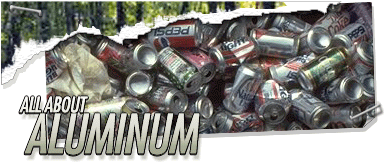
 |
 
Aluminum
 
Because the melting point of aluminum is so high, in order to extract the aluminum from the ore and process it into sheets or ingots, it takes massive amounts of energy. In remote places like the Amazon, this energy often comes from massive hydroelectric plants — dams on the wild rivers. These dams, while stemming the wild flow of the river and thus preventing the normal movement of wildlife, also flood vast areas of pristine rainforests. Hundreds of large dams have been built to feed the demand for power for aluminum mines and mills. One dam, the Tucurui Dam on the Tocantins River in Brazil, flooded 600,000 acres of primary rainforests — an environmental catastrophe of gargantuan proportions (see the abstract of an article by Dr. Philip Fearnside of the National Institute for Research on the Amazon, INPA) and his submission to the World Commission on Dams for the conference, Large Dams and their Alternatives in Latin America: Experiences and Lessons Learned, that occurred in August of 1999 in One of the ironic realities of these dam impound lakes is that, when they flood forests, the trees under the water very slowly decompose. This decomposition takes place in an oxygen-deprived environment (called anaerobic), and the bacteria that decompose the trees are thus anaerobic bacteria. Anaerobic bacteria produce methane (CH4) as a by-product, rather than ammonia. Methane (natural gas) is 25-times more powerful as a greenhouse gas than carbon dioxide (CO2). This means that a large hydroelectric dam that floods forests is actually more destructive in terms of global warming than a power plant that burns fossil fuels. Hydro power is certainly not the “clean” energy it has been promoted to be. Further, the flooding of lowland forests forces people living and subsisting in those forests further up the slopes. Shifting cultivation there leads to greater erosion and therefore greater silting of the river. This silt can end up clogging the dam. Many dams that were supposed to last 10 years or more have become non-productive in as little as two years due to excessive siltation. Not to mention the thousands of species simply wiped out by the flooding. It takes the same amount of energy contained in a 12-oz. can-full of gasoline, to make a 12-oz. aluminum can. Throwing an aluminum can away sends a message to the aluminum companies to make more aluminum from virgin ore — that is, "mine more rainforests and flood more rainforests". Aluminum is 100% recyclable. Making a can from a recycled can spares 95% of the energy it takes to make it from virgin ore. But even that 5% is a lot of energy. Every year we throw out enough aluminum in this country to rebuild the entire commercial airline fleet of US planes four times over! Avoid aluminum as much as you can. Glass is a much better option in terms of environmental impact. Even though it is heavier, and thus takes more energy to ship, it is relatively much less energy intensive than aluminum, which takes massive amounts of energy to produce and form. You can avoid drinks in disposable containers by bringing your own water or juice with you in a reusable container. If you do use aluminum, make sure you recycle it. Aluminum is found in many common products other than cans, such as inexpensive lawn furniture, window frames, poles, etc. Make sure you recycle these products when you're done with them. Contact companies to tell them to find alternative to packaging with aluminum. Contact aluminum producers, such as Alcoa and others and tell them to stop building new dams on rainforest rivers. Alcoa Corporate Center 201 Isabella Street Pittsburgh, PA 15212-5858 USA Phone: 412-553-4545 Fax: (412) 553-4498 www.alcoa.com |
 |

|
||||||||||||||||||||||
 | |||||||||||||||||||||||||
|
| |||||||||||||||||||||||||
 Copyright 2006 Rainforest Relief |
|||||||||||||||||||||||||

